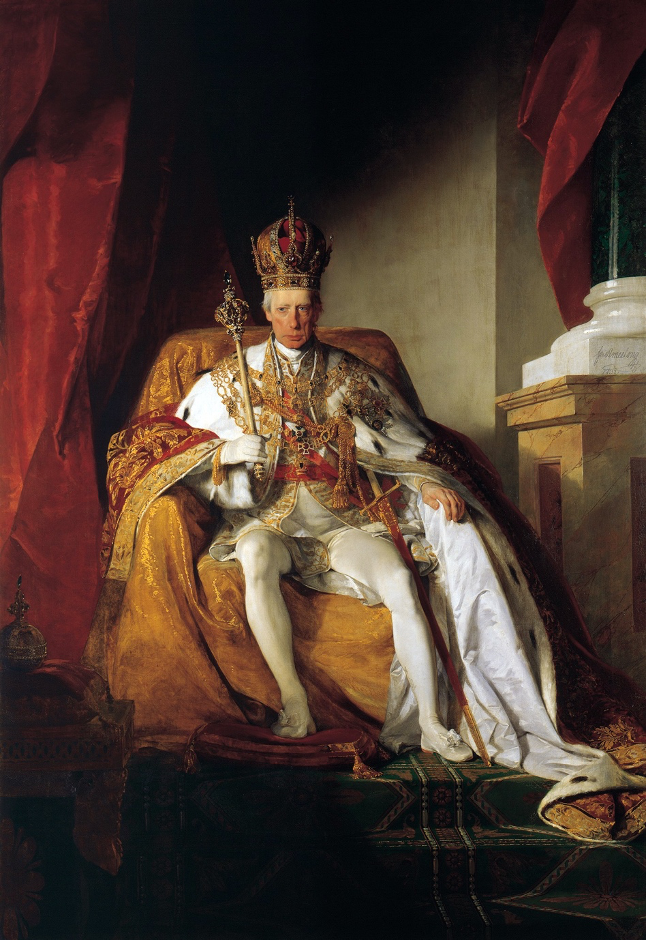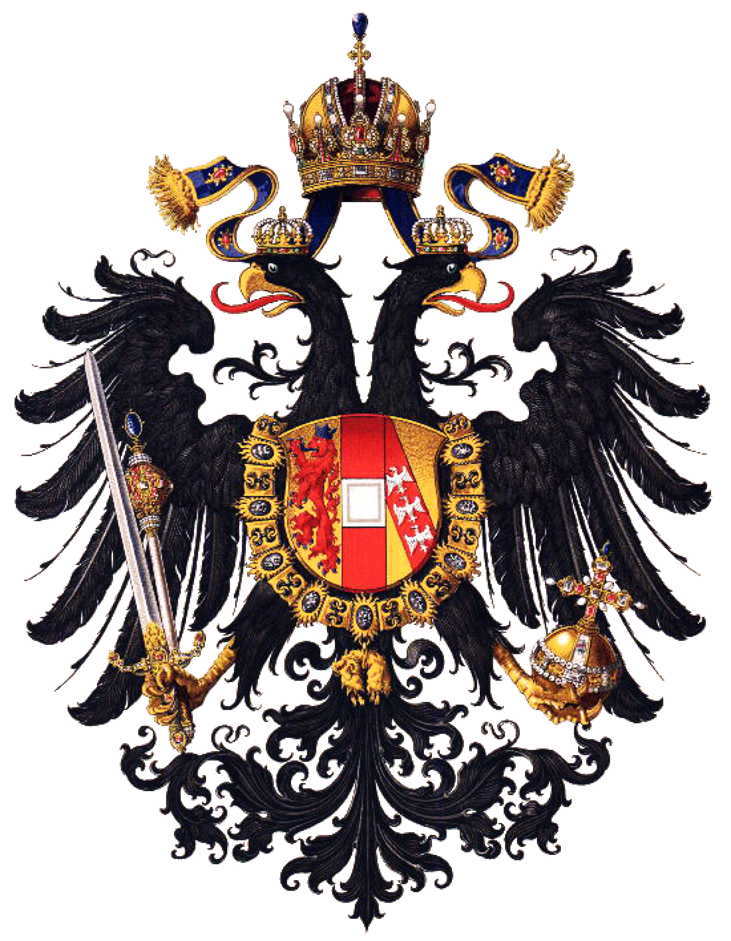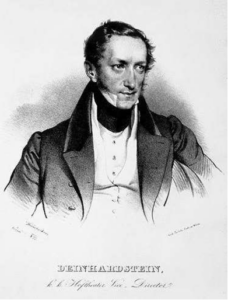For the Emperor's birthday
(Poet's title: Am Geburtstage des Kaisers)
Set by Schubert:
D 748
for alto, tenor, bass, chorus and orchestra[January 1822]
Steig empor, umblüht von Segen,
Schöner goldbekrönter Tag,
Glühend pochet dir entgegen
Uns’rer treuen Herzen Schlag.
Heil dir Tag, voll Pracht und Glanz,
Du gabst uns den Vater Franz.
Unter seinem Fürstenschilde
Grünen Kunst und Wissenschaft,
In dem Zepter wohnt die Milde
Und in seinem Schwert die Kraft.
Friedenspalm’ und Siegesglanz
Schmücken unsern Vater Franz.
Ihm, dem Mächt’gen, dem Gerechten
Lasst uns Tat und Willen weihn,
Grüne Myrten lasst uns flechten
Und den Lorbeer schlingt hinein.
Unser’s Vaterlandes Glanz
Gab und schirmet Vater Franz.
Lass ihn alle Freuden haben,
Ihn, der unsrer Freude Stern;
Sende deine besten Gaben
Unserm kaiserlichen Herrn.
Hüte seiner Krone Glanz,
Ew’ger! unserm Vater Franz.
Step up, wreathed in blessings,
Beautiful day with your golden crown,
As we come to meet you, feel the glowing, pounding
Beat of our true hearts.
Greetings to you, day full of majesty and brilliance,
Which gave us our father Franz.
Beneath his princely shield
Art and science blossom,
Gentleness resides in his sceptre
And power in his sword.
The palm of peace and the glow of victory
Adorn our father Franz.
To him, the powerful, the just,
Let us dedicate our actions and desires,
Let us plait green myrtle
And tie it around the laurel tree.
The splendour of our fatherland
Was given to us and is protected by father Franz.
Let him share all our joys,
Him, the star of our joys;
Send your best gifts
To our imperial lord.
Guard the splendour of his crown
For ever! our father Franz.
All translations into English that appear on this website, unless otherwise stated, are by Malcolm Wren. You are free to use them on condition that you acknowledge Malcolm Wren as the translator and schubertsong.uk as the source. Unless otherwise stated, the comments and essays that appear after the texts and translations are by Malcolm Wren and are © Copyright.
☙
Themes and images in this text:
Crowns Father and child Gold Hearts Kings and Emperors Shields Songs for special occasions Swords and daggers

Grand Duke Franz Joseph Karl was born on 12th February 1768. In 1792 (with the death of his father, Emperor Leopold II) he became King of Hungary and Bohemia etc. and was elected Holy Roman Emperor as Franz II. In anticipation of Napoleon abolishing the Holy Roman Empire (which duly happened after the defeat at Austerlitz in 1805) Franz changed his title to Franz I, Emperor of Austria in August 1804.
Ottto Deutsch’s Documentary Biography of Schubert includes the following letter (dated 23rd January 1822) by Peter Brukner, Director of the Theresian Academy of Knights to its Curator, Freiherr von Herzogenberg:
Sir, The assistant teacher of aesthetics at the I. and R. [Imperial and Regal] Theresianum, Deinhardstein, has written for the celebration at the Musical Entertainment a hymn in the manner of 'God keep our Emperor Francis,' which has been set to music by Schubert and is to be sung by a choice of academic pupils on the eve of His Majesty's most exalted birthday-feast. The most obediently-disposed directorate submits the same to your Grace's condescending inspection and requests the sanction and exalted signature necessary for forwarding the same to the censorship and the printer. Otto E. Deutsch, Schubert. A Documentary Biography English translation by Eric Blom London 1946 Nr. 271A page 209

☙
Original Spelling Am Geburtstage des Kaisers Steig empor, umblüht vom Segen, Schöner goldgekrönter Tag, Glühend pochet dir entgegen Uns'rer treuen Herzen Schlag. Heil dir Tag, voll Pracht und Glanz, Du gabst uns den Vater F r a n z . Unter seinem Fürstenschilde Grünen Kunst und Wissenschaft, In dem Zepter wohnt die Milde Und in seinem Schwert die Kraft. Friedenspalm' und Siegesglanz Schmücken unsern Vater F r a n z . Ihm, dem Mächt'gen, dem Gerechten Laßt uns That und Willen weih'n, Grüne Myrthen laßt uns flechten Und den Lorbeer schlingt hinein. Unser's Vaterlandes Glanz Gab und schirmet Vater F r a n z . Laß ihn alle Freuden haben, Ihn, der uns'rer Freude Stern; Sende deine besten Gaben Unserm kaiserlichen Herrn. Hüthe seiner Krone Glanz, Ew'ger! unserm Vater F r a n z .
Note: This is Deinhardstein’s text as written in Schubert’s manuscript. There are a few minor changes made by a third party, which were adopted by Breitkopf & Härtel (1892) in the Alte Gesamtausgabe, Serie XVII. The first print of Schubert’s cantata appeared 1822 in connection with the first performance. It features a different first stanza.
Hoch entzückt, im reichen Segen,
Den du spendest jeden Tag,
Pochet glühend Dir entgegen
Aller treuen Herzen Schlag.
Heil Dir Heil! umstrahlt von Glanz,
Heil Dir guter Vater Franz.
In 1849 the cantata was published by Diabelli as Schubert’s op. posth. 157 with a completely different text and the title Constitutionslied.


